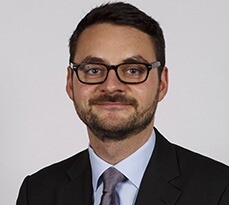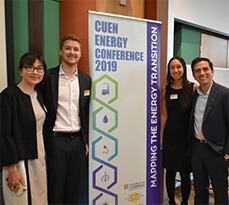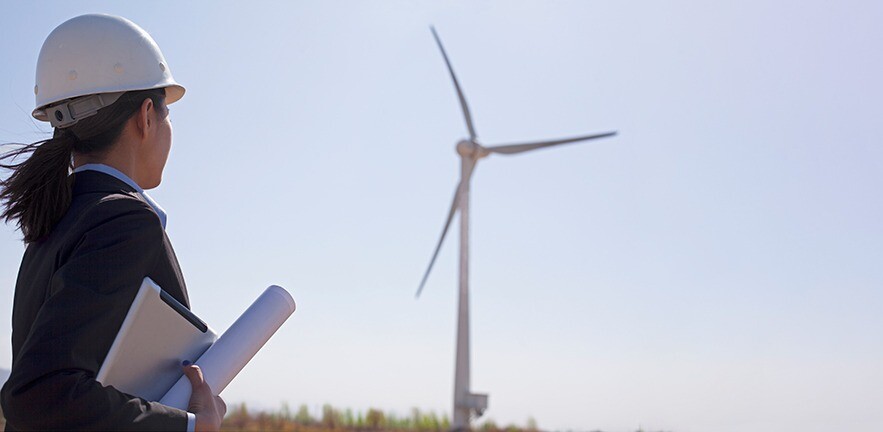In a world where the UN and climate scientists have recently issued sober warnings about the urgency of taking action on climate change to prevent the worst impacts, it has never been more important to assess the state of renewables and the wider energy landscape. We asked two crucial questions of Cambridge Judge alumni working in the energy sector.
First, we asked a member of faculty to set the scene.
The Cambridge MBA academic – Dr David Reiner

Dr David Reiner is University Senior Lecturer in Technology Policy and Assistant Director of the Energy Policy Research Group with research interests which include national climate change policies, consumer behaviour and public and stakeholder perceptions of the energy transition. He teaches an elective course on the Cambridge MBA: Strategies for Energy and Climate, which forms part of the Energy & Environment Concentration.
“The energy sector itself is in the process of dramatic transformation, with quite unprecedented challenges emerging for, historically, some of the most profitable firms in the world. This is being driven by the confluence of several emerging trends:
- A dramatic fall in variable renewable energy costs and the accompanying need for ancillary services and energy storage.
- Major disruptions and uncertainties in energy markets such as the advent of US shale oil and gas revolutions and the fraying of OPEC.
- Digitalisation meeting century-old wires and networks.
- The imperative on climate action, as agreed in the Paris Accord, with rhetorical support from governments and given voice by a new generation of activists on the one hand, versus the hesitant and somewhat feeble implementation of such measures to address climate change on the other.
“In the UK and EU more widely, there has been a clear rise in populism in national politics and many of these populist parties are avowedly sceptical of climate action. Moreover, populist movements such as the ‘gilets jaunes’ in France, have been motivated by opposition to carbon taxes and fuel price hikes, which are seen as regressive. As one manifestation of that populist sentiment, Brexit is particularly jarring for energy and climate policy, since the UK has long been the main driver of energy and environmental policy in the EU. UK leadership has been manifest both in terms of the shift towards a more liberalised EU-wide energy sector and in terms of shifting energy and environmental policy to focus on climate action as paramount rather than industrial policy or renewables deployment. Despite (or perhaps in reaction to) these more climate sceptical populist movements, we see have seen recently a renewed urgency with David Attenborough’s recent documentary Climate Change – The Facts, the Extinction Rebellion movement shutting down central London, and activist student Greta Thunberg’s school strikes across Europe.
“Looking across the Atlantic, I am not aware of any evidence that sceptics have been further emboldened now that Trump is in the White House, although clearly his administration has installed quite strident figures in key posts in departments such as Interior and the EPA and they have halted or reversed measures undertaken under the Obama Administration. Usually, having a president of one party and ideology tends to catalyse opposition from the other side. We have seen in the US a strong reaction to Trump’s election and a rejuvenated environmental movement, which has been particularly active in the last two years. Moreover, although the Green New Deal, as proposed by Representative Alexandria Ocasio-Cortez and other figures on the left, has received much attention, perhaps even more interesting has been the overwhelming bipartisan agreement on resisting the Trump Administration’s proposed cuts and maintaining strong funding for energy and environment, as well as recent efforts by Republican senators to fund a Manhattan Project for energy research.”
Sheela Sanei (MBA 2016)

Sheela’s role is in business development for global solar developer/investor/EPC company ib vogt based in Berlin. She is responsible for generating business and raising financing. Her background in M&A transactions, credit, leveraged finance, data analytics, and relationship management gave her the skills she needs to pursue her passion for channelling capital to renewable energy.
What are the trends you see in the global energy sector over the next few years?
“I see conventional forms of generation losing popularity as initial capex requirements of solar and wind continue to drop and climate change prevention gains traction. In many geographies, subsidies are no longer needed to support new project investment and this is a very interesting shift in the ever-adapting renewables business model. We will see a slew of utilities and energy companies (especially among private off-takers) committing to buy electricity from renewables plants for gradually extending tenors. These private off-takers are a whole new demand pool for renewables, which traditionally relied on governments for revenue, meaning more projects will attract investment and the global capacity of renewables will increase.”
What is required to support this, in terms of international co-operation, financing and management skills?
“As I mentioned, the business model for renewables projects has been changing over time as costs to build decrease, the off-taker pool expands, and banks become more comfortable with the technologies. In terms of international co-operation, developers and investors will need to get comfortable with investing in projects cross-border so that there is technology and investment transfer. Also, more robust international environmental credit systems would provide mechanisms for cross-border investment and natural capitalism more broadly. In terms of financing, banks will need to become comfortable with private off-take structures, which are more complex, are usually more variable than a FiT system, and introduce a new counterparty credit risk element. This is often uncharted territory in non-US regions. As interest rates may not rise at a pace that attracts investors to fixed-income markets, renewables serve as a nice alternative to equity investors looking for stable returns. In fact, regardless of market behaviour, I see renewables as an attractive asset class as the classic technology risk has reduced dramatically without changing expected returns, meaning renewables have an out-sized risk-return profile. The management skills required to support renewables expansion continue to increase in complexity as subsidies dry up and are replaced by power trading instruments. In renewables, it will remain a requirement to be able to communicate with all walks of life to get a deal done. The quants for the financing and off-takes, the developers for project inception, and the technology providers for equipment are just a handful of examples of stakeholders in the mix.”
Gunnar Herzig (MBA 2015)

Gunnar Herzig, Alumni Council member, devotes most of his time to non-profit organisation World Forum Offshore Wind (WFO) a new startup which promotes offshore wind energy worldwide. Gunnar and his fellow entrepreneurs focus solely on offshore wind energy (no onshore) and take a global perspective, staking their claim to be the first global offshore wind advocacy body with members including E.ON, Innogy, the Asia Wind Energy Association and others.
What are the trends you see in the global energy sector over the next few years?
“Offshore wind will grow strongly. The tremendous cost reductions we have seen in this industry over the past two to three years (especially in the UK, Germany, Denmark and the Netherlands) have created a global offshore wind boom. We now see dynamic activities around the world, in new markets such as Taiwan, Japan, South Korea as well as in North America, with both the east and west coasts showing exciting offshore wind development activities.”
“It is our WFO mission to achieve ‘500 by 50’ – adding 500 GW of globally installed offshore wind capacity by 2050. By the end of 2018 we had 22 GW of globally installed capacity. This mission statement is based on the recent offshore wind study by IRENA (International Renewable Energy Association) which sees the potential for offshore wind worldwide at around 520 GW of installed capacity by 2050.”
What is required to support this, in terms of international co-operation, financing and management skills?
“International corporation is absolutely essential in developing a global offshore wind industry. This is exactly why we founded WFO – to bring the global offshore wind community (developers, suppliers, service companies, investors, banks etc.) together to share lessons learnt and to learn from one another about established, as well as new offshore wind markets.
“In terms of financing, the offshore wind industry needs more institutional capital from investors such as pension funds, infrastructure funds and insurance companies.
“Regarding management skills, the offshore wind industry will always need highly skilled technical experts, as well as experienced project managers, and skillsets in commercial areas such as finance or contract management.”
Gabriel Ronacher-Passos-Silva (MBA 2018)

Gabriel Ronacher-Passos-Silva has wide experience in the oil and gas sector in Brazil, witnessing at first-hand how vulnerable it is to fluctuating prices and the global impact this has. The boom in solar and wind farms in Brazil in recent decades sparked his interest in the new energy landscape and led him to the Cambridge MBA, where he has been involved with private equity, entrepreneurship and energy markets. He is a co-chair of the Energy & Sustainability SIG, led the CUEN (Cambridge University Energy Network) Annual Energy Conference 2019 and is finishing his Cambridge MBA studies later this year.
What are the trends you see in the global energy sector over the next few years?
“The energy sector is in very dynamic times but it is very unlikely that oil and gas will stop being produced in at the end of the so called ‘energy transition’. The larger the stake of renewables in the grid, the less stable the grid is, since sun and wind intensities vary during the day and do not match the peak consumption hours of our modern society. This offset between energy generation and energy consumption hours has driven a trend for a solution to energy storage or energy systems that offer resilience and stability to the electric grid, balancing the grid. The battery storage market alone is expected to grow 25 times by 2040.

“Another important trend is electrification. A larger percentage of our energy consumption will come from electricity and electric vehicles companies such as Tesla are disrupting the car market. The next challenge is how to electrify residential heating, and heat pumps are receiving a lot of attention lately. The third trend is a sub-product of electrification. As companies become aware of the amount of data generated by consumers and start having the technological capabilities to make sense of it, such as machine learning and AI, they can offer new services. These could be informing the consumer if they left home with electrical appliances still on or automatically changing to an energy supplier that charges less.”
What is required to support this, in terms of international co-operation, financing and management skills?
“In a world in which the technology is advancing at a faster pace than regulators can respond, being able to make sense of a huge amount of data from different sources, and understanding the forces at play in each renewable, is imperative for decision-makers. Regarding management skills, the Cambridge MBA has equipped me with tools such as understanding capital markets and how incentives influence countries, corporations and people involved in the energy industries.”
Yaa Serwaah Amoah Kwateng (MBA 2016)

Yaa Serwaah Amoah Kwateng is working on a PhD in Future Power Networks and Smart Grids. Yaa’s MBA capstone project led to a successful investment pitch for a proposed low carbon energy startup. She then developed the business plan over the summer Entrepreneurship Bootcamp – an experience she says has been pivotal in her ambition to design an architecture model for a ‘prosumer-inspired, clean microgrid market that integrates artificial intelligence and blockchain towards an autonomous, optimal and transparent power value network’.
What are the trends you see in the global energy sector over the next few years?
“The future of the energy ecosystem is decarbonised, distributed (decentralised), digitalised and democratised. Policy drivers (such as COP 21) and technological innovation (reflected in the declining cost of distributed energy such as wind and solar power) are converging to progress the decarbonisation and decentralisation of energy supply. The proliferation of energy prosumers drives an increase in distributed generation with decrease in electricity cost and can concurrently, through demand flexibility, address the stability challenges of an increasingly distributed network. Greater prosumer autonomy and price competitiveness disrupt current energy business models.
“Digitalisation is the emerging organising logic for innovative ecosystems and platform-based business models. From microgrids to macro grids, blockchain, the emergent distributed-ledger technology, and prosumers can combine to integrate power and information to make transparent the production, record and actualisation of value in an optimal Energy 4.0 industry.”
What is required to bring this on, in terms of international co-operation, financing and management skills?
“With the balance of power shifting to the end of the energy value chain, the rules of the game need to change to facilitate new business models. Regulatory reform is crucial for driving multi-stakeholder engagement and integrating all value network participants including new actors such as prosumers and aggregators. Top-down action, such as timely-planned infrastructure deployment, is needed to accelerate the electrification of transport, new mobility trends and smart cities.
“Digitalisation and transparency not only enable peer-to-peer transactions but facilitate greater monitoring and better prediction of the performance of energy investments, which then drives informed investment decisions and helps them thrive.
“The digitalisation of energy necessitates the transformation and redefinition of C-suite roles to include chief digital and chief transformation officers, for example, who can insightfully lead the incorporation of innovative technologies and themes such as internet of things, artificial intelligence, blockchain, cybersecurity, data mining and 5G into transformative business drivers to deliver efficiencies and growth in a dynamically evolving digital landscape.”


